I don’t have Gut problems, can I still benefit from taking Bio-Heal?Updated 15 days ago
We are firm believers in the necessity of probiotic support for most individuals, and here's why: Our modern lifestyles and dietary habits have significantly disrupted the delicate balance of bacteria in our guts, leading to a host of health issues. Factors such as frequent use of prescription antibiotics, consumption of high-carbohydrate diets, exposure to fluoridated tap water, and heightened levels of stress have collectively contributed to the depletion of beneficial bacteria in our gut microbiome.
To compound this issue, our bodies struggle to replenish these beneficial bacteria at a rate sufficient for maintaining optimal health. As a result, it becomes imperative to recognize and mitigate the impact of common factors that contribute to the destruction of probiotics in our system. Here are seven key probiotic killers that we believe should be avoided or minimized:
1. **Prescription antibiotics**: While antibiotics serve a vital role in fighting bacterial infections, their indiscriminate use can disrupt the balance of bacteria in the gut, leading to an overgrowth of harmful microbes.
2. **Excessive sugar intake**: High consumption of sugar and refined carbohydrates provides an ideal environment for pathogenic bacteria and yeast to thrive, thereby crowding out beneficial probiotics.
3. **Drinking tap water**: Chlorine and fluoride, commonly found in tap water, can have detrimental effects on the delicate balance of gut bacteria, further compromising overall gut health.
4. **GMO foods**: Genetically modified organisms (GMOs) and the associated pesticides used in their production can disrupt the gut microbiome and compromise immune function.
5. **Consumption of whole grains and gluten**: While whole grains can be a valuable source of nutrients, some individuals may experience gut irritation and inflammation due to the presence of gluten and other anti-nutrients.
6. **Emotional stress**: Chronic stress can negatively impact gut health by altering gut motility, increasing intestinal permeability, and suppressing immune function, all of which can disrupt the balance of gut bacteria.
7. **Exposure to toxins and pesticides**: Environmental toxins and pesticides found in food, water, and everyday products can disrupt the delicate balance of gut bacteria and contribute to gut dysbiosis.
In the face of these probiotic killers, it's essential to prioritize strategies that support the restoration and maintenance of a healthy gut microbiome. By minimizing exposure to these factors and incorporating probiotic-rich foods and supplements into your diet, you can help restore balance to your gut microbiome and support overall health and well-being.